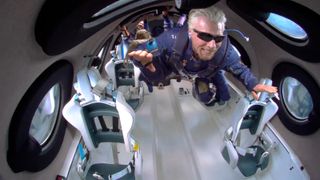
Virgin Galactic has been cleared for liftoff once more.
The U.S. Federal Aviation Administration (FAA) has wrapped up its six-week inquiry into the July 11 test flight of Virgin Galactic's VSS Unity suborbital space plane, agency officials announced Wednesday (Sept. 29).
The July 11 mission was a big one for Virgin Galactic. It was the company's fourth spaceflight and first-ever fully crewed journey to the final frontier — and Virgin Group founder Richard Branson was one of the people who made the historic trip. Branson rode in Unity's cabin with three Virgin Galactic employees, and two pilots sat at the controls in the cockpit, as on all of the space plane's spaceflights.
In photos: Virgin Galactic's 1st fully crewed spaceflight with Richard Branson
The investigation, which began on Aug. 11, determined that Unity did indeed veer out of its designated airspace during its descent on July 11, an issue first reported by The New Yorker's Nicholas Schmidle.
"The FAA also found Virgin Galactic failed to communicate the deviation to the FAA as required. Virgin Galactic was not allowed to conduct flight operations as the investigation was ongoing," FAA officials said in an emailed statement Wednesday.
"The FAA required Virgin Galactic to implement changes on how it communicates to the FAA during flight operations to keep the public safe," they added. "Virgin Galactic has made the required changes and can return to flight operations."
Get the Space.com Newsletter
Breaking space news, the latest updates on rocket launches, skywatching events and more!
Virgin Galactic will also update its calculations to expand protected airspace on future flights, company representatives said in a statement Wednesday.
"We appreciate the FAA's thorough review of this inquiry," Virgin Galactic CEO Michael Colglazier said in the statement. "Our test flight program is specifically designed to continually improve our processes and procedures. The updates to our airspace and real-time mission notification protocols will strengthen our preparations as we move closer to the commercial launch of our spaceflight experience."
Unity has a few more test flights to complete before full commercial operations can begin. The next trial mission, which will carry members of the Italian Air Force to suborbital space, will lift off no earlier than mid-October.
After that flight, Virgin Galactic plans to perform extensive maintenance and upgrade work on Unity's carrier plane, known as VMS Eve. (Eve drops Unity at an altitude of about 50,000 feet, or 15,000 meters, at which point Unity fires up its rocket motor for the trip to space.) Eve will likely be out of action until the middle of next year, Virgin Galactic representatives have said.
Virgin Galactic is currently selling tickets to ride the six-passenger VSS Unity for $450,000 apiece. The company's main competitor in the suborbital space tourism industry, Jeff Bezos' Blue Origin, has not divulged its ticket prices.
Mike Wall is the author of "Out There" (Grand Central Publishing, 2018; illustrated by Karl Tate), a book about the search for alien life. Follow him on Twitter @michaeldwall. Follow us on Twitter @Spacedotcom or Facebook.
Join our Space Forums to keep talking space on the latest missions, night sky and more! And if you have a news tip, correction or comment, let us know at: community@space.com.

Michael Wall is a Senior Space Writer with Space.com and joined the team in 2010. He primarily covers exoplanets, spaceflight and military space, but has been known to dabble in the space art beat. His book about the search for alien life, "Out There," was published on Nov. 13, 2018. Before becoming a science writer, Michael worked as a herpetologist and wildlife biologist. He has a Ph.D. in evolutionary biology from the University of Sydney, Australia, a bachelor's degree from the University of Arizona, and a graduate certificate in science writing from the University of California, Santa Cruz. To find out what his latest project is, you can follow Michael on Twitter.